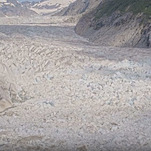This skinny plant is a huge threat to border security
A new border security bill drafted by Republicans in the House of Representatives includes many familiar items, such as funding for double-layer fencing and surveillance drones.
One request, however, seems more like suburban yardwork than a threat to national security. The measure calls for the eradication of a bamboo-like plant that grows along the Rio Grande.
The plant, called Carrizo cane in Texas, is an invasive species that shoots up along the banks of waterways, forming an interlocking network of subterranean roots that crowds out other plants and makes it hard to remove.
Environmentalists see it as a hazard to ecological diversity. On the border, though, it poses a separate problem: the stalks—which grow up to 30 feet tall—provide cover for people trying to cross illegally.
“It stretches hundreds and hundreds of yards at a time, so they’ll duck in and they’ll hide in it,” said Chris Cabrera, a 13-year Border Patrol veteran and the vice president of a local union for agents. “It’s hard to see what’s going on it there, whether it’s a person or an animal.”
Texas law enforcement patrols the Rio Grande on July 24, 2014 in Mission, Texas. (John Moore/Getty Images)
That’s made the plant an enemy of the Department of Homeland Security (DHS), which oversees Border Patrol. Over the past decade, government contractors have tried a number of tricks to remove it from the banks of the Rio Grande in South Texas. They’ve explored attacking the vegetation with herbicides and turning it into a snack for hungry wasps, a natural predator to Carrizo cane in other parts of the world. So far, they haven’t solved the issue.
The plants are considered enough of a threat to border security to warrant a place in the new legislation introduced by House Homeland Security Chairman Michael McCaul (R-Texas). A group of Republicans in the Senate introduced a companion bill on Wednesday, also mentioning the canes.
The legislation calls for eradication of the plants “to the greatest extent practicable.” If passed, the law would require DHS to keep the vegetation under control to prove the border was secure.
-

-

-

-

-

-

-

-

-

-

-

-

-

-

-

-

-

-

-

-

-

-

-

-

-

-

-

-

-

-

-

-

-

-

-

-

-

-

-

-

-

-

-

-

-

-

-

-

-

-

-

-

-

-

-

-

-

-

-

-

-

-

-

-

-

-

-

-

-

-

-

-

-

-

-

-

-

-

-

-

-

-

-

-

-

-

-

-

-

-

-

-

-

-

-

-

-

-

-

-

-

-

-

-

-

-

-

-












































































































